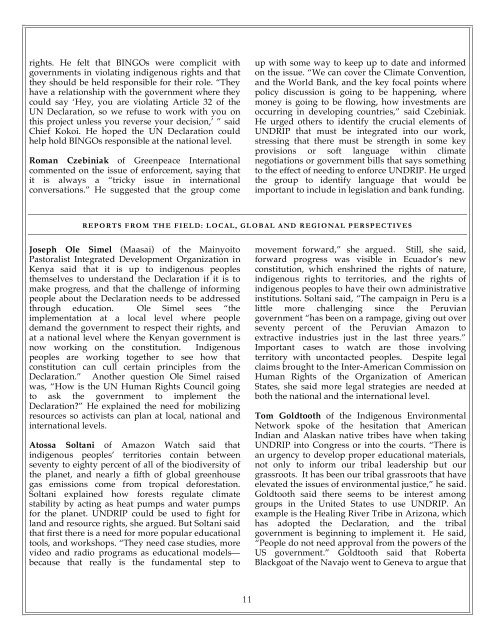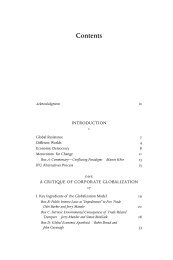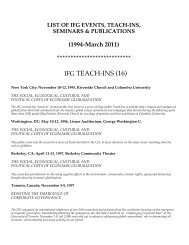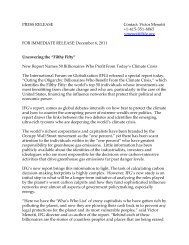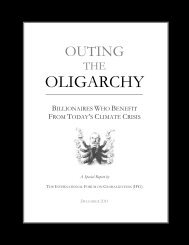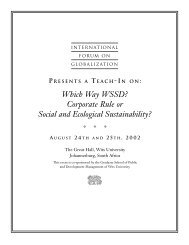UNDRIP Report - English FINAL - International Forum on Globalization
UNDRIP Report - English FINAL - International Forum on Globalization
UNDRIP Report - English FINAL - International Forum on Globalization
You also want an ePaper? Increase the reach of your titles
YUMPU automatically turns print PDFs into web optimized ePapers that Google loves.
ights. He felt that BINGOs were complicit with<br />
governments in violating indigenous rights and that<br />
they should be held resp<strong>on</strong>sible for their role. “They<br />
have a relati<strong>on</strong>ship with the government where they<br />
could say ‘Hey, you are violating Article 32 of the<br />
UN Declarati<strong>on</strong>, so we refuse to work with you <strong>on</strong><br />
this project unless you reverse your decisi<strong>on</strong>,’ ” said<br />
Chief Kokoi. He hoped the UN Declarati<strong>on</strong> could<br />
help hold BINGOs resp<strong>on</strong>sible at the nati<strong>on</strong>al level.<br />
Roman Czebiniak of Greenpeace <str<strong>on</strong>g>Internati<strong>on</strong>al</str<strong>on</strong>g><br />
commented <strong>on</strong> the issue of enforcement, saying that<br />
it is always a “tricky issue in internati<strong>on</strong>al<br />
c<strong>on</strong>versati<strong>on</strong>s.” He suggested that the group come<br />
up with some way to keep up to date and informed<br />
<strong>on</strong> the issue. “We can cover the Climate C<strong>on</strong>venti<strong>on</strong>,<br />
and the World Bank, and the key focal points where<br />
policy discussi<strong>on</strong> is going to be happening, where<br />
m<strong>on</strong>ey is going to be flowing, how investments are<br />
occurring in developing countries,” said Czebiniak.<br />
He urged others to identify the crucial elements of<br />
<str<strong>on</strong>g>UNDRIP</str<strong>on</strong>g> that must be integrated into our work,<br />
stressing that there must be strength in some key<br />
provisi<strong>on</strong>s or soft language within climate<br />
negotiati<strong>on</strong>s or government bills that says something<br />
to the effect of needing to enforce <str<strong>on</strong>g>UNDRIP</str<strong>on</strong>g>. He urged<br />
the group to identify language that would be<br />
important to include in legislati<strong>on</strong> and bank funding.<br />
REP O RTS F RO M TH E FIEL D: L O C AL, GL O B AL AND R EGI O NA L P ER SP EC TIV ES<br />
Joseph Ole Simel (Maasai) of the Mainyoito<br />
Pastoralist Integrated Development Organizati<strong>on</strong> in<br />
Kenya said that it is up to indigenous peoples<br />
themselves to understand the Declarati<strong>on</strong> if it is to<br />
make progress, and that the challenge of informing<br />
people about the Declarati<strong>on</strong> needs to be addressed<br />
through educati<strong>on</strong>. Ole Simel sees “the<br />
implementati<strong>on</strong> at a local level where people<br />
demand the government to respect their rights, and<br />
at a nati<strong>on</strong>al level where the Kenyan government is<br />
now working <strong>on</strong> the c<strong>on</strong>stituti<strong>on</strong>. Indigenous<br />
peoples are working together to see how that<br />
c<strong>on</strong>stituti<strong>on</strong> can cull certain principles from the<br />
Declarati<strong>on</strong>.” Another questi<strong>on</strong> Ole Simel raised<br />
was, “How is the UN Human Rights Council going<br />
to ask the government to implement the<br />
Declarati<strong>on</strong>?” He explained the need for mobilizing<br />
resources so activists can plan at local, nati<strong>on</strong>al and<br />
internati<strong>on</strong>al levels.<br />
Atossa Soltani of Amaz<strong>on</strong> Watch said that<br />
indigenous peoples’ territories c<strong>on</strong>tain between<br />
seventy to eighty percent of all of the biodiversity of<br />
the planet, and nearly a fifth of global greenhouse<br />
gas emissi<strong>on</strong>s come from tropical deforestati<strong>on</strong>.<br />
Soltani explained how forests regulate climate<br />
stability by acting as heat pumps and water pumps<br />
for the planet. <str<strong>on</strong>g>UNDRIP</str<strong>on</strong>g> could be used to fight for<br />
land and resource rights, she argued. But Soltani said<br />
that first there is a need for more popular educati<strong>on</strong>al<br />
tools, and workshops. “They need case studies, more<br />
video and radio programs as educati<strong>on</strong>al models—<br />
because that really is the fundamental step to<br />
movement forward,” she argued. Still, she said,<br />
forward progress was visible in Ecuador’s new<br />
c<strong>on</strong>stituti<strong>on</strong>, which enshrined the rights of nature,<br />
indigenous rights to territories, and the rights of<br />
indigenous peoples to have their own administrative<br />
instituti<strong>on</strong>s. Soltani said, “The campaign in Peru is a<br />
little more challenging since the Peruvian<br />
government “has been <strong>on</strong> a rampage, giving out over<br />
seventy percent of the Peruvian Amaz<strong>on</strong> to<br />
extractive industries just in the last three years.”<br />
Important cases to watch are those involving<br />
territory with unc<strong>on</strong>tacted peoples. Despite legal<br />
claims brought to the Inter-American Commissi<strong>on</strong> <strong>on</strong><br />
Human Rights of the Organizati<strong>on</strong> of American<br />
States, she said more legal strategies are needed at<br />
both the nati<strong>on</strong>al and the internati<strong>on</strong>al level.<br />
Tom Goldtooth of the Indigenous Envir<strong>on</strong>mental<br />
Network spoke of the hesitati<strong>on</strong> that American<br />
Indian and Alaskan native tribes have when taking<br />
<str<strong>on</strong>g>UNDRIP</str<strong>on</strong>g> into C<strong>on</strong>gress or into the courts. “There is<br />
an urgency to develop proper educati<strong>on</strong>al materials,<br />
not <strong>on</strong>ly to inform our tribal leadership but our<br />
grassroots. It has been our tribal grassroots that have<br />
elevated the issues of envir<strong>on</strong>mental justice,” he said.<br />
Goldtooth said there seems to be interest am<strong>on</strong>g<br />
groups in the United States to use <str<strong>on</strong>g>UNDRIP</str<strong>on</strong>g>. An<br />
example is the Healing River Tribe in Ariz<strong>on</strong>a, which<br />
has adopted the Declarati<strong>on</strong>, and the tribal<br />
government is beginning to implement it. He said,<br />
“People do not need approval from the powers of the<br />
US government.” Goldtooth said that Roberta<br />
Blackgoat of the Navajo went to Geneva to argue that<br />
11


